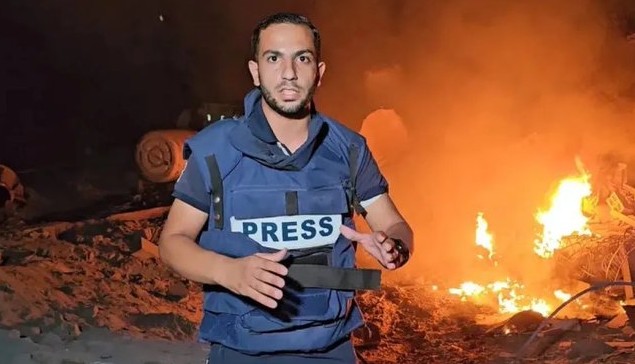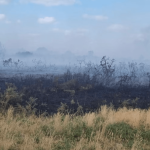Israeli Strike Kills Five Al Jazeera Journalists in Gaza
Gaza has lost some of its most recognised voices. An Israeli airstrike on Gaza City has killed seven people, among them, at least five journalists working for Al Jazeera.
The network confirmed the deaths, naming its late correspondents and crew members. Anas Al-Sharif, a leading voice from inside the besieged territory, was among those killed.
He had been covering the war from the front lines for months, delivering reports that reached audiences far beyond Gaza’s borders.
Mohammed Qreiqeh, another Al Jazeera reporter, died in the same strike. Camera operators Ibrahim Zaher, Mohammed Noufal, and Moamen Aliwa were also killed.
“The order to kill Anas Al-Sharif, one of Gaza’s bravest journalists, along with his colleagues, is a desperate attempt to silence voices ahead of the occupation of Gaza,” Al Jazeera said in a statement.
Minutes before his death, Al-Sharif posted a haunting message on social media: “If this madness does not end, Gaza will be reduced to ruins, its people’s voices silenced, their faces erased, and history will remember you as silent witnesses to a genocide you chose not to stop.”
He was inside a tent marked ‘Press’, positioned near Al-Shifa Hospital’s entrance, when the missile struck. Hospital director Dr Mohammad Abu Salmiya confirmed his death alongside the others.
The Israeli military has claimed Al-Sharif was leading a Hamas cell responsible for launching rockets towards civilians and soldiers.
They pointed to what they described as “unequivocal proof” of his ties to the group, allegations he firmly rejected just weeks ago, writing that he was a “journalist with no political affiliations” whose sole duty was to “report the truth from the ground, as it is, without bias.”
“At a time when a deadly famine is ravaging Gaza, speaking the truth has become, in the eyes of the occupation, a threat,” he wrote in that same post.
The Committee to Protect Journalists had already raised concerns about Al-Sharif’s safety, warning that Israeli military rhetoric appeared to be laying the groundwork for his assassination.
Since the conflict began nearly two years ago, the organisation says 186 journalists have been killed.
Al-Sharif, married with two young children, had prepared a message in case he did not survive: “I urge you to care for my beloved daughter, Shams, the light of my eyes, whom time did not allow me to see grow as I had dreamed.
And I recommend you to care for my dear son, Salah, whom I wish to be a support and companion on his journey until he grows strong enough to share the burden and continue the message.
I urge you not to be silenced by chains, nor to be hindered by borders, and to be bridges towards the liberation of the land and its people, until the sun of dignity and freedom shines upon our occupied homeland.”
The United Nations previously dismissed Israel’s claims against Al-Sharif as “online attacks and unfounded accusations.”
Irene Khan, the UN Special Rapporteur on freedom of expression, had warned just two weeks ago: “I am deeply alarmed by repeated threats and accusations of the Israeli army against Anas Al-Sharif, the last surviving journalist of Al Jazeera in northern Gaza.”
International media have been barred from entering Gaza since the war began. In a twist of timing, just hours before the fatal strike, Prime Minister Benjamin Netanyahu announced that foreign journalists would now be permitted to enter, but only with Israeli Defence Forces approval.
For Al Jazeera, this loss is more than a headline. It’s the silencing of voices that had risked everything to tell Gaza’s story.






